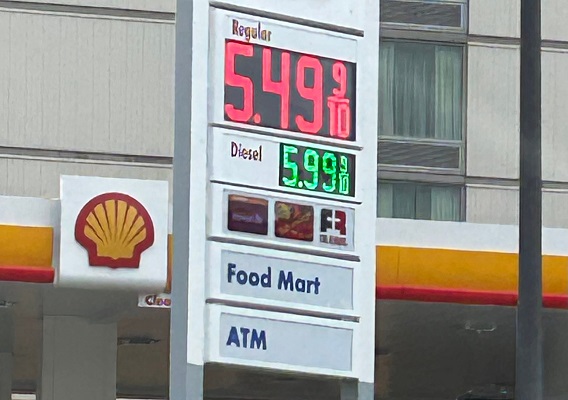It so happens I am in Seattle, Washington, this week helping my son settle into a new living/job situation, and one of the first things you notice when driving around this city is how absurdly expensive gasoline is.
$5.30 per gallon of regular as opposed to the national average of $3.80 – a $1.50 difference, according to AAA. What I see with my own eyes is closer to $5.50.
That’s $88 to fill a sixteen-gallon tank. It’s the highest cost for gas in the nation, vying with California for that dubious distinction. But, if our policymakers in Montpelier have their way, California and Washington will soon have another competitor in that race: Vermont.
The reason for Washington’s astronomical prices at the pump is the passage in 2021 of a “cap and trade” program (aka a Carbon Tax), forcing certain businesses that generate greenhouse gas emissions (according to the state website: “business types include (but are not limited to) fuel suppliers, natural gas and electric utilities…”) to purchase carbon allowances in order to sell their product to consumers. This is much like the one our legislature just passed for home heating fuel (S.5) and just like the one the Vermont Climate Council is urging on our little state for motor fuels such as gas and diesel.
Washington’s carbon tax went into effect in January of this year. The first quarterly auction of “carbon credits” took place on February 28, and since then, its impact on per-gallon gas and diesel prices is estimated at somewhere between 41 and 55 cents — and steadily rising. It will be interesting to see what happens to home heating fuel prices when that market gears up as cold weather sets in. Some here are already raising that alarm.
Like Vermont, Washington lawmakers passed their own version of our Global Warming Solutions Act (theirs is called the “Climate Commitment Act”), mandating greenhouse gas reduction with targets starting in 2035 and reaching “net zero” by 2050. And, like Vermont, they did so under a smokescreen of misinformation and outright lies about what the program would do. The big lie – just as we’ve been hearing here in Vermont about the Clean Heat Standard carbon tax on home heating fuels – is that the cost increases resulting would only amount to “pennies.” That’s a clever spin, I guess, as there’s no limit to the number of pennies they’re really talking about.
But that’s not the only complaint. As a story in Climate Wire summarizes, “[A]nger is rising among other groups, including some that had supported passage of the climate law, which say Democratic officials did not prepare the public for the costs.” That’s a nice way of saying the politicians deceived the public about the policy in order to pass it.
Among those aggrieved are Native American tribes who say the high prices are regressive and thus disproportionately hurting the poor. The farming and fishing communities claim that even though fuel for their industries was exempt from the law, obligated fuel dealers are adding the cost of the credits onto their bills anyway. The fuel dealers counterclaim that the onerous $10,000 per day fine for selling un-credited fuel is so onerous, coupled with the complicated nature of selling fuel to customers for whom you can’t ultimately know what they use the fuel for, means dealers can’t afford to make a mistake about who they charge and who they don’t. Vermont farmers and foresters should take note of this when similar promises are made to them by our own politicians and activists.
The impact of all this on Washington State residents’ cost of living and quality of life doesn’t look pleasant. Again in reference to that Climate Wire article, “The Department of Ecology recently drew criticism after quietly editing its webpage describing the climate law’s impacts: First, it said the program was expected to affect Washington’s gas prices by 1 to 3 percent; it was changed to say the department expects an impact of 1 to 3 percent on the entire state economy (emphasis added).”
Oops. Not an insignificant typo there! Conveniently corrected after the law passed, of course. Vermonters can expect similar oopsie “typo” corrections when our Clean Heat Standard goes into full effect. But we can learn from Washington and avoid a carbon tax on gasoline. Our legislature hasn’t done it yet. Let’s make sure they cross it off their wish list.
